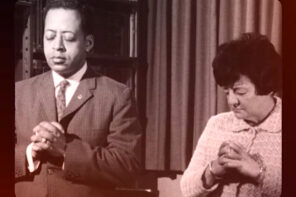This week tens of thousands are making the trek across the United States, and from around the world, to be a part of Burning Man. While participants are generally ecstatic about their week-long experience, some segments of society are filled with dread. Recent efforts at making Nevada City a companion city for Burning Man, for example, were met with strong opposition from city leaders out of fear that “the city’s image and business projects would be tainted,” and of course religious groups, including conservative evangelicals, have had their issues as well.
Although a few evangelical critics have written positive analyses of Burning Man, including an essay in Christian Research Journal by Steve Rabey, and a recent essay in Christianity Today by Phil Wyman, the gathering in Nevada’s Black Rock Desert is considered by many to be a deviant event, and a harbinger of spiritual and societal decay.
I was reminded of this in May when I received a call from Steve Matthews, a “cult and new religious movement expert and investigative journalist” with The Worldview Center, who was in the process of writing an essay for the Spiritual Counterfeits Project, an evangelical “counter-cult apologetic” organization.
Matthews, who got in touch based on research I conducted for my masters thesis (subsequently published in book form), was in the process of writing a two-part essay to appear in SCP Journal, the first installment of which is titled “Burning Man: Preview To An Alternative Pagan Social Order.” The article is largely descriptive, rather than interpretive—the substantial part of Matthews’ critique will come in the second installment in the series, but can also be found in an article he published online and in radio interviews.
In consideration of Burning Man’s origins, Matthews critiques the “creation myth” of the event. Matthews views the popular portrayal, provided by founder Larry Harvey, as suspect and he provides an alternative understanding that relies on the testimony of Michael “Flash” Hopkins, a friend of Harvey’s who claims to have been a key collaborator in the initial inspiration for Burning Man. While Hopkins’ claim should certainly be acknowledged, it remains anecdotal—scholars have long noted that Burning Man did not begin in a vacuum.
In the same article Matthews also portrays Burning Man participants as marginalized individuals with “countercultural leanings,” including “adherents of the New Age and Paganism, along with scores of partiers, nudists, and those who like to ‘get high.’” The presence of this kind of reveler can’t be denied, but Matthews’ stereotype neglects the depth of the festival’s demographics. This includes not just those outside the cultural mainstream, but also a number of professionals connected to the social movement called the Cultural Creatives, discussed by Paul Ray and Sherry Ruth Anderson, which includes “writers, artists, musicians, psychotherapists, environmentalists, feminists, alternative health care providers, and other professionals.”
It is when Matthews discusses the spirituality of Burning Man—one that he characterizes as “a blend of New Age and postmodern Paganism”—that his analysis is most problematic. What’s at issue here is his analytical framework, his understanding of Paganism, and his representation of a generalized Burning Man spirituality.
In his analytical framework, Matthews draws upon an evangelical counter-cult methodology that views most spiritual alternatives as heretical and deviant. Douglas Cowan has described this apologetic framework as a form of reality construction and boundary maintenance. The use of this approach often leads to a misunderstanding of a given religion (usually various new religious movements) and we see a good example of these failings in Matthews’ interpretations of Burning Man spirituality—as well as his representation of Paganism. This includes his confused distinction between various forms of Paganism, and his faulty critique of Paganism, claiming that it “denies the dignity of man,” “leads to hedonism and self-indulgence,” and “ignores the problem of evil,” to name a few. Personal relationships with Pagans, as well as familiarity with the writings of Pagan scholars like Gus diZerega would help avoid such errors.
In addition to these problems, it is certainly a mistake to characterize Burning Man and its adherents in general as Pagan. The festival invokes a multiplicity of spiritual perspectives—including the New Spirituality and Paganism—but it is by no means a Pagan event.
Matthews’ analysis is likewise lacking in self-critique. In my own work I have suggested ways in which early Christianity—a movement that arose as a counterculture in the desert long ago, was viewed by the dominant culture as deviant, and engaged in a variety of bizarre beliefs and rituals—might learn from another desert counterculture. I have suggested that Christianity in America has much to learn from Burning Man, including the need to rediscover its own countercultural origins and the practice of speaking truth to power, concepts of self and community in postmodernity, the significance of play as a possible “signal of transcendence,” the importance of festivals with their rituals of inversion and the critique of society, and utopian considerations.
Matthews includes some acknowledgement of lessons the church could learn from Burning Man, but this is overshadowed by the misunderstanding and misrepresentations of this alternative cultural event.
For evangelicals like Matthews, Burning Man embodies deep-seated fears which can also be seen playing out in other aspects of American culture. Many conservatives fear that America is undergoing decay, and this is taking place in the spiritual realm as well. A lingering economic malaise, coupled with our continued cultural fascination with apocalyptic scenarios, provides a context in which Burning Man functions as a Rorschach test.
For critics like Matthews, peering as he does through a narrow theological and apologetic lens, Black Rock City is a “Pagan” challenge to Christian culture. For others, it offers hope for spiritual revolution, both within and without the church.
[This article was changed to correct an error introduced during editing—in which Matthews is represented as suggesting that Michael Hopkins had the original idea for Burning Man. –The Eds.]




